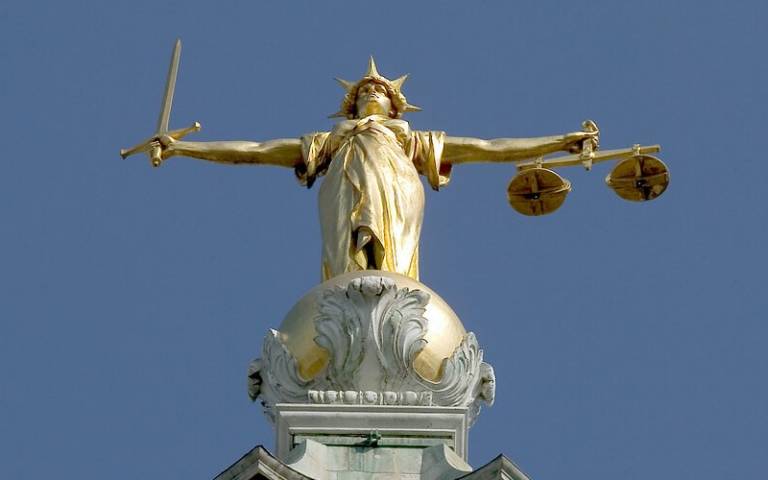Online | The Comparative Study of Miscarriages of Justice in Light of the English Experience
07 February 2023, 6:00 pm–7:30 pm

A UCL Centre for Criminal Law event
Event Information
Open to
- All
Organiser
-
UCL Laws Events
Chair: David Ormerod KC, UCL Laws
Speaker: Kent Roach, University of Toronto
Commentators/Discussants:
- Jon Robins (Brighton)
- Hannah Quirk (KCL)
- Henry Blaxland KC (Garden Court Chambers)
About this talk
What can be learned from the experience in England and Wales about remedying miscarriages of justice? This talk will discuss the English experience in the context of ongoing research that examines ways to remedy miscarriages of justice in Australia, Canada, India, New Zealand and the United States. The experience of a review commission limited to factual innocence in North Carolina and the recent creation of a criminal cases review commission in New Zealand and recent proposals in Canada will be examined. In addition, ambitious proposals in India to compensate “wrongful prosecutions” and the creation of second subsequent appeals in several Australian states will also be examined. Topics to be examined include the reaction of appellate courts to referrals of cases from the executive, referral and appeal tests including whether sentences should be in the mandate of review commissions, the dangers of underfunding commissions, factual innocence in relation to miscarriages of justice, the role of defence counsel and innocence projects, and the implications of the rise in the number of guilty plea wrongful convictions receiving remedies.
Watch the recording
- About the Speaker
Kent Roach is Professor of Law at the University of Toronto Faculty of Law. He is a graduate of the University of Toronto and of Yale, and a former law clerk to Justice Bertha Wilson of the Supreme Court of Canada. Professor Roach has been editor-in-chief of the Criminal Law Quarterly since 1998. In 2002, he was elected a Fellow of the Royal Society of Canada. In 2013, he was one of four academics awarded a Trudeau Fellowship in recognition of his research and social contributions. In 2015, he was appointed a Member of the Order of Canada. In 2016, named (with Craig Forcese) one of the top 25 influential lawyers in Canada (change-maker category) by Canadian Lawyer. He was awarded the Molson Prize for the social sciences and humanities in 2017.
He is the author of 16 books including Constitutional Remedies in Canada (winner of the Owen best law book Prize); Due Process and Victims’ Rights (short listed for the Donner Prize for public policy), The Supreme Court on Trial (same); (with Robert J. Sharpe) Brian Dickson: A Judge’s Journey (winner of the Dafoe Prize) and The 9/11 Effect: Comparative Counter-Terrorism (winner of the Mundell Medal); (with Craig Forcese) False Security: The Radicalization of Canadian Anti-Terrorism (winner of the Canadian Law and Society Association best book prize); Canadian Justice, Indigenous Injustice: The Gerald Stanley/Colten Boushie Case (short listed for the Shaughnessy Cohen prize for political writing); Remedies for Human Rights Violations: A Two-Track Approach to Supra-national and National Law (runner up for Canadian Council on International law book prize for 2020-21) and Canadian Policing: Why and How it Must Change (finalist for the 2022 Balsillie Prize in Public Policy.) He is also the author of the Criminal Law and Charter volumes in Irwin Law’s essentials of Canadian law series. His next book Wrongfully Convicted: Guilty Pleas, Imagined Crimes and What Canada Must Do To Safeguard Justice will be published by Simon and Schuster in 2023. He is the co-editor of 13 collections of essays and 3 casebooks including Comparative Counter-Terrorism published by Cambridge University Press in 2015. He has also written over 275 articles and chapters published in Australia, China, Hong Kong, India, Israel, Italy, Japan, Singapore, South Africa, the United Kingdom and the United States, as well as in Canada.
Professor Roach has served as research director for the Goudge Inquiry into Pediatric Forensic Patholology, for the Commission of Inquiry into the Investigation of the Bombing of Air India Flight 182, for the Independent Civilian Review of Toronto Police Missing Persons Investigations and for the public consultations resulting in A Miscarriage of Justice Commission report. He served as volume lead for the Truth and Reconciliation Commission's Report on the Legacy of Residential Schools He was a member of the research advisory committees for the inquiry into the rendition of Maher Arar, the Ipperwash Inquiry into the killing of Dudley George and the Commission into the 2022 Public Order Emergency. He has been a member of Canadian Council of Academies expert panels on policing and subsequently on Indigenous policing. He is also co-founder of the Canadian Registry of Wrongful Convictions.
Professor Roach has won awards for his pro bono work and contributions to civil liberties. He has represented Aboriginal and civil liberties groups in many interventions before the courts, including Gladue, Wells, Ipeelee and Anderson on sentencing Indigenous offenders, Latimer on mandatory minimum sentences, Stillman, Dunedin Construction, Ward, Conseil Francophone and G v. Ontario on Charter remedies, Golden on strip searches, Khawaja on the definition of terrorism, Chouhan on peremptory challenges and Corbiere and Sauve on voting rights.
 Close
Close

